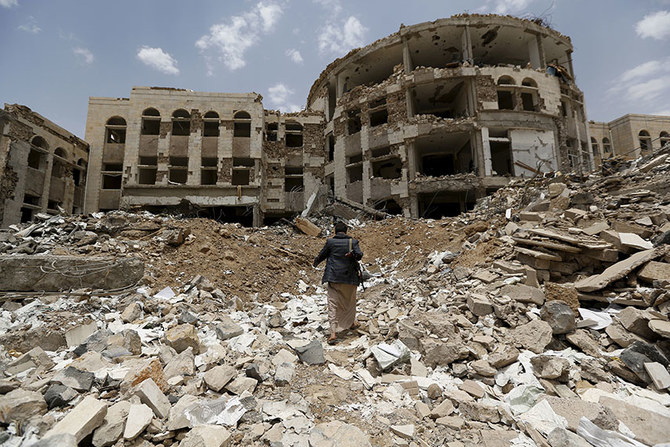AL-MUKALLA: Yemenis will remember 2022 as the year that saw the longest halt in hostilities since the beginning of the war, and the emergence of a new governing body that united the country’s competing groups.
UN Yemen envoy Hans Grundberg said on April 1 that the internationally recognized government of Yemen and the Iran-backed Houthis had agreed to a two-month ceasefire that would entail restoring Sanaa airport, allowing fuel tankers to enter Hodeidah port, and opening highways in the city of Taiz and other provinces.
The declaration came days after the Arab coalition halted its bombing of Yemen in a bid to clear the way for peace.
Prior to the ceasefire, and as Grundberg shuttled between Yemen and regional towns to negotiate the truce, hundreds of Houthis died outside the city of Marib in heavy fighting with the government as they attempted to take control of the city in order to strengthen their position at the negotiating table.
Despite predictions that the ceasefire would be short-lived, the truce has resulted in a major drop in violence outside Marib, Taiz and other battlefields, while commercial planes finally took off from Sanaa for the first time in years and fuel tankers started to trickle into the port of Hodeidah.
On June 2, Grundberg declared that the parties had agreed to extend the ceasefire under the same conditions, despite the Yemeni government’s complaint that the Houthis had failed to relieve their siege of Taiz, a crucial condition of the truce.
Two months later, Grundberg made a similar declaration about the parties’ decision to extend the ceasefire for another two months. But in October, he said the parties failed to extend the truce after the Houthis rejected a fresh proposal about the opening of roads in Taiz and the payment of public workers.
The UN and other international organizations said that between April and October, the number of war-related deaths was at its lowest level since the beginning of 2015.
New governing body
Yemen’s former President Abed Rabbo Mansour Hadi, who took office in 2012 following an uncontested election, transferred his powers on April 7 to an eight-member Presidential Leadership Council led by Rashad Al-Alimi, the former interior minister.
The council drew together competing anti-Houthi groups, including pro-independence southerners, supporters of former President Ali Abdullah Saleh, senior military officers and governors.
Ten days later, the council returned to the southern city of Aden, was sworn in before parliament, and created a military committee to unite opposing armed groups and military forces under its authority.
The formation of the council happened days after the start of Yemen discussions in Riyadh, which brought together a large number of Yemeni political, religious, military, security and tribal forces to develop a road plan for the nation under the auspices of the Gulf Cooperation Council.
Fighting and assassinations
Despite the relative quiet on the battlefield in 2022, killings occurred in Aden and Sanaa, as well as the Houthi bombardment of civilian areas in Taiz, and their cross-border drone and missile assaults on the UAE and Saudi Arabia.
In March, the Houthis launched drone attacks and fired missiles against Saudi Arabian oil and water desalination facilities.
The Houthis also attacked oil infrastructure in Abu Dhabi on April 17, killing three people and raising worldwide anger.
Yemeni experts said that the Houthis initiated their strikes on the UAE and Saudi Arabia in an effort to persuade them to end their military support for the Yemeni government, which had evicted them from the southern province of Shabwa and was advancing on Marib province.
Also in 2022, politicians, military personnel and journalists were killed in a series of bombings and drive-by shootings in both government-controlled Aden and Houthi-controlled Sanaa.
Brig. Gen. Thabet Jawas, one of the army’s commanders throughout the six wars with the Houthis, was killed by a car bomb in Aden in March. In June, Saber Al-Haidari, a Yemeni journalist, was also killed in a bomb blast in the city.
In Sanaa, unidentified men killed 63-year-old Supreme Court judge Mohammed Hamran on Sept. 1, days after kidnapping him from his home.
Former Yemeni ambassador and retired military commander Maj. Gen. Dirham Noman was killed at his apartment in Sanaa on Oct. 16.
Fighting Al-Qaeda
Taking advantage of the respite in hostilities with the Houthis, Yemen’s military and security forces in September started a military offensive to dislodge Al-Qaeda militants from their long-held strongholds in the southern provinces of Abyan and Shabwa.
For the first time in years, Yemeni troops achieved success in the Omaran Mountain area, which has long functioned as a safe haven for Al-Qaeda, where militants planned attacks, trained and recruited members, and harbored captives.
Relapse
In October, the Houthis dashed hopes of negotiating peace and ending the conflict by flying drones at government-controlled oil terminals in Hadramout and Shabwa.
As a consequence, oil supplies were halted and the Yemeni government was forced into insolvency after losing its key source of revenue.
The UN estimated in December that more than 21 million Yemenis, out of a population of 32.6 million, would need humanitarian assistance in 2023.



































